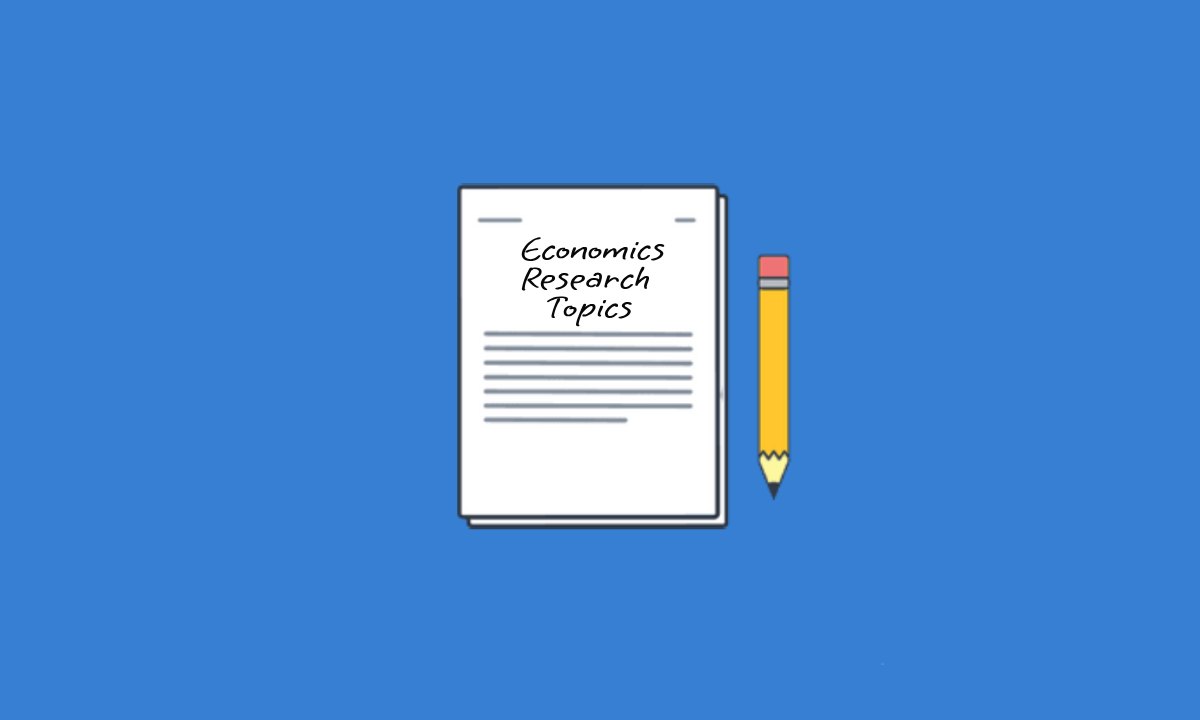Below is a list of different examples of titles and topic ideas for research projects in both qualitative and quantitative approach to thesis of economics.
Examples of Titles & Topic Ideas for Economics Thesis:
- Analyze the relationship between central bank policies and national economic performance.
- Study the causes and consequences of income inequality in different countries.
- Examine the effects of globalization on international trade and local economies.
- Investigate how psychological factors influence economic decision-making.
- Explore the economic costs and benefits of addressing climate change.
- Analyze the effectiveness of government interventions in market economies.
- Study the impact of cryptocurrencies on traditional financial systems and economies.
- Examine trends in employment, unemployment, and wages.
- Analyze how immigration affects host and home country economies.
- Investigate the economic implications of healthcare policies and systems.
- Study the factors driving economic growth in developing countries.
- Analyze the impact of government spending and taxation on economic stability.
- Explore how technological advancements drive economic transformation.
- Examine the relationship between urban development and economic growth.
- Study the impact of education on workforce productivity and economic development.
- Investigate the economic challenges and opportunities in the agricultural sector.
- Analyze the causes and consequences of economic crises and the effectiveness of recovery measures.
- Examine the role and impact of international financial markets on global economies.
- Study the impact of income distribution on social welfare and economic stability.
- Investigate how consumer confidence influences economic indicators and overall economic health.
- Analyze the relationship between corporate governance practices and economic performance.
- Study the impact of tax policies on individual and corporate economic behavior.
- Examine the economic implications of energy production, consumption, and policy.
- Explore how innovation drives economic growth and competitiveness.
- Investigate the effectiveness of economic policies in reducing poverty.
- Study the impact of international aid on economic development in recipient countries.
- Analyze the effects of regional trade agreements on economic integration and growth.
- Examine the impact of the gig economy on traditional labor markets and employment patterns.
- Study the role and impact of public sector activities on economic performance.
- Investigate how behavioral biases affect financial decision-making and market outcomes.
Microeconomics Research Topics:
Home Economics:
- Investigate the impact of sustainable practices on household energy consumption and waste reduction.
- Examine the effectiveness of incorporating nutritional education into school curricula and its impact on students’ eating habits.
- Assess the importance of financial literacy programs in managing household budgets and preventing debt.
- Explore how technology, including smartphones and social media, influences family relationships and communication.
- Analyze the challenges and opportunities faced by home-based businesses, particularly in the context of economic stability.
- Study how traditional and evolving gender roles affect the division of labor and responsibilities within households.
- Research traditional and modern food preservation methods and their efficacy in extending the shelf life of perishable items.
- Investigate consumer attitudes and behaviors towards purchasing eco-friendly products for home use.
- Examine the impact of parental involvement in early childhood education and development.
- Explore strategies for preventing common household accidents and promoting safety in the home environment.
Behavioral Economics:
- Investigate how the fear of losses can lead to suboptimal investment strategies and portfolio choices.
- Study how mental shortcuts or rules of thumb (like the availability heuristic or anchoring) affect consumer purchasing behavior.
- Explore how small changes in the way choices are presented (nudges) can influence people’s decisions in areas like health, finance, and environmental conservation.
- Examine how individuals’ preferences change over time, leading to procrastination and difficulties in long-term planning.
- Analyze how behavioral economics can inform the design and implementation of public policies to improve outcomes in areas such as taxation, education, and social welfare.
- Investigate how social norms and peer pressure shape economic behaviors like saving, spending, and charitable giving.
- Study how psychological factors influence how consumers perceive prices and value, including phenomena like price anchoring and the decoy effect.
- Explore how psychological biases and irrational behaviors contribute to market anomalies, such as bubbles and crashes.
- Investigate how decision fatigue affects economic decision-making and the quality of choices made over time.
- Study the role of emotions, such as fear, joy, and anger, in influencing economic decisions in contexts like gambling, investing, and consumer spending.
Health Economics:
- Investigate how different types of health insurance (public vs. private) affect health outcomes and access to care.
- Analyze the economic benefits of preventive health measures, such as vaccinations, screenings, and lifestyle interventions.
- Examine the direct and indirect costs associated with chronic diseases like diabetes, heart disease, and cancer.
- Study the relationship between healthcare spending and overall economic growth in different countries or regions.
- Assess the impact of drug pricing policies and market regulations on drug availability, affordability, and innovation.
- Explore disparities in healthcare access and outcomes based on socioeconomic status, race, gender, or geographic location.
- Investigate the role of HTAs in decision-making processes for new medical technologies and their impact on healthcare costs and quality.
- Analyze the economic challenges and opportunities associated with aging populations, including healthcare costs and workforce implications.
- Study how cognitive biases and heuristics influence health-related decisions by patients, providers, and policymakers.
- Examine the effects of global health programs, such as those targeting HIV/AIDS, malaria, or tuberculosis, on local economies and healthcare systems.
Agricultural Economics:
- Investigate how changing climate conditions affect crop yields and farm income.
- Analyze the cost-benefit of adopting sustainable practices such as organic farming, permaculture, or agroforestry.
- Examine the barriers smallholder farmers face in accessing markets and how these can be overcome.
- Study the role of government subsidies in ensuring food security and their impact on market prices.
- Assess the economic impact of technological advancements like precision farming, GMOs, and automated machinery.
- Analyze how global trade agreements and policies affect agricultural exports from developing countries.
- Investigate the role of microfinance in supporting small-scale farmers and its impact on agricultural productivity.
- Explore the efficiency of agricultural supply chains and the role of logistics in reducing post-harvest losses.
- Study the economics of farm labor, including the impact of migration patterns on agricultural labor markets.
- Examine how different land tenure systems influence agricultural productivity and rural development.
Financial Economics:
- Investigate how psychological factors and cognitive biases affect financial markets and lead to anomalies.
- Analyze how financial technology (Fintech) innovations, such as mobile banking and blockchain, are disrupting traditional banking models.
- Study the role of cryptocurrencies in financial markets, their volatility, and regulatory challenges.
- Examine the methods used by financial institutions to manage various types of risks, including credit risk, market risk, and operational risk.
- Analyze the relationship between corporate governance structures and the financial performance of firms.
- Investigate the impact of regulatory policies on the stability and efficiency of financial markets.
- Study the effects of high-frequency trading on market liquidity, price discovery, and volatility.
- Explore the causes and consequences of financial crises, with a focus on systemic risk and contagion effects.
- Examine the determinants of a firm’s capital structure and how it affects the firm’s value and cost of capital.
- Analyze the factors influencing exchange rates and their impact on international trade and investment.
Business Economics:
- Exploring how globalization has affected the growth, sustainability, and competitive strategies of SMEs.
- Analyzing how advancements in technology influence economic development and productivity across different industries.
- Investigating how psychological factors and cognitive biases affect business decisions and market outcomes.
- Examining the relationship between a company’s CSR initiatives and its financial performance.
- Assessing the short-term and long-term economic impacts of mergers and acquisitions on companies and markets.
- Evaluating how disruptions in global supply chains, such as those caused by pandemics or geopolitical tensions, affect economic stability and business operations.
- Analyzing the rise of the gig economy and its implications for traditional labor markets, worker rights, and economic policy.
- Investigating the balance between sustainability initiatives and their economic impact on businesses.
- Exploring the factors that drive innovation and entrepreneurial activity and their effects on economic growth and development.
- Studying how different trade policies and agreements affect domestic economic performance, industry competitiveness, and consumer welfare.
Sports Economics:
- Assessing the short-term and long-term economic effects of events like the Olympics, World Cup, or Super Bowl on host cities and countries.
- Analyzing the financial health and sustainability of professional sports teams in various leagues.
- Investigating how sports sponsorships influence brand recognition, consumer behavior, and company revenues.
- Examining how player transfer fees and salaries impact team finances, competitive balance, and league economics.
- Evaluating the economic justification and outcomes of using public funds to build sports stadiums.
- Exploring how local sports teams and events affect economic activities, job creation, and business growth in their communities.
- Analyzing the financial dynamics of sports broadcasting rights, including their impact on teams, leagues, and media companies.
- Investigating the economic implications of sports betting, including its effects on sports integrity, fan engagement, and government revenues.
- Examining the economic factors contributing to the gender pay gap in professional sports and potential solutions.
- Assessing the economic consequences of the COVID-19 pandemic on sports leagues, teams, and related industries.
Labor Economics:
- Analyzing how changes in the minimum wage affect employment levels, particularly among low-skilled workers.
- Investigating the implications of gig economy jobs on worker income, job security, and overall welfare.
- Examining the factors contributing to the gender wage gap and evaluating policies aimed at reducing this disparity.
- Exploring how technological advancements in automation and artificial intelligence influence job displacement and the demand for different skills.
- Assessing the economic integration of immigrants into the labor market and the impact of immigration policies on employment outcomes.
- Analyzing the relationship between workplace diversity and productivity, including the economic benefits and challenges of diverse work environments.
- Investigating the effects of labor unions on wages, job security, and overall labor market outcomes.
- Studying the rise of remote work, its impact on productivity, work-life balance, and urban economies.
- Exploring the causes of youth unemployment and evaluating the effectiveness of various policy interventions to address this issue.
- Examining how different levels of education and vocational training impact employment prospects and earnings across various industries.
Macroeconomics Research Topics:
Development Economics:
- Evaluating the effectiveness of microfinance institutions in reducing poverty and improving living standards in developing countries.
- Analyzing the relationship between investment in education and long-term economic growth in low-income countries.
- Assessing the economic impact of public health interventions, such as vaccination programs or sanitation improvements, in developing regions.
- Investigating how gender equality in education, employment, and entrepreneurship contributes to overall economic development.
- Exploring strategies to increase agricultural productivity and their effects on food security and rural livelihoods.
- Studying the economic consequences of rapid urbanization and the challenges and opportunities it presents for developing countries.
- Examining the effectiveness of foreign aid in promoting sustainable economic development and reducing poverty.
- Analyzing the role and dynamics of the informal economy in developing countries and its implications for labor market policies.
- Investigating the impact of technology adoption, particularly information and communication technologies (ICT), on economic growth and development.
- Assessing the economic vulnerability of developing countries to climate change and exploring adaptive strategies to mitigate its impacts.
Environmental Economics:
- Analyzing the economic costs and benefits of climate change on different sectors such as agriculture, health, and infrastructure.
- Evaluating the effectiveness of carbon pricing mechanisms and emissions trading systems in reducing greenhouse gas emissions.
- Investigating the economic viability and impacts of transitioning to renewable energy sources, including wind, solar, and bioenergy.
- Assessing the effectiveness and efficiency of environmental regulations and policies, such as the Clean Air Act or the Paris Agreement.
- Exploring economic strategies for the sustainable management of natural resources, including water, forests, and fisheries.
- Estimating the economic value of ecosystem services, such as pollination, water purification, and carbon sequestration.
- Analyzing the role of innovation and technology in promoting environmental sustainability and economic growth.
- Studying the economic aspects of waste management, including recycling, landfill use, and waste-to-energy technologies.
- Evaluating the economic benefits and costs of biodiversity conservation efforts and their impact on local and global economies.
- Investigating the economic dimensions of environmental justice, focusing on how environmental policies and practices affect different socioeconomic groups.
Monetary Economics:
- Exploring the implications, design, and potential economic impacts of CBDCs on the monetary system and financial stability.
- Analyzing the relationship between monetary policy and financial stability, particularly in the context of unconventional monetary policies such as quantitative easing.
- Comparing the effectiveness of inflation targeting and price level targeting frameworks in achieving macroeconomic stability.
- Investigating the challenges and effectiveness of monetary policy when interest rates are at or below zero.
- Assessing the impact of cryptocurrencies on traditional monetary policy and the implications for central banks.
- Studying the channels through which monetary policy affects the economy, including the credit channel, interest rate channel, and exchange rate channel.
- Analyzing how expectations of households, firms, and financial markets influence the effectiveness of monetary policy.
- Investigating the unique challenges and strategies for conducting monetary policy in emerging market economies.
- Exploring the validity and relevance of the Phillips Curve in explaining the relationship between unemployment and inflation in the modern economy.
- Evaluating the importance of central bank independence for effective monetary policy and the mechanisms for ensuring accountability and transparency.
Fiscal Policy
- Investigating the size and impact of fiscal multipliers on economic growth, particularly during recessions and expansions.
- Analyzing the conditions under which public debt becomes unsustainable and the implications for fiscal policy.
- Studying the effects of different tax policies on income inequality and the redistribution of wealth.
- Assessing the effectiveness of fiscal stimulus measures in promoting economic recovery during and after economic downturns.
- Exploring how different types of government spending (e.g., infrastructure, education, healthcare) affect long-term economic growth.
- Evaluating the effectiveness of fiscal rules, such as balanced budget requirements and debt brakes, in promoting fiscal discipline.
- Investigating how automatic stabilizers, such as unemployment benefits and progressive taxes, help to stabilize the economy during economic fluctuations.
- Analyzing the impact of fiscal decentralization on economic performance, public service delivery, and regional inequalities.
- Studying the extent to which public investment crowds out or crowds in private sector investment.
- Exploring the fiscal challenges posed by aging populations and the policy measures required to address them.
Inflation:
- Analyzing historical cases of hyperinflation to understand their causes, economic impacts, and the policies that successfully stabilized the economy.
- Investigating how inflation expectations influence consumer behavior, wage setting, and business investment decisions.
- Exploring the contemporary relevance of the Phillips Curve and the relationship between inflation and unemployment.
- Assessing the effectiveness of different monetary policy strategies, such as inflation targeting and interest rate adjustments, in controlling inflation.
- Studying the impact of supply chain disruptions, such as those caused by pandemics or trade conflicts, on inflation rates.
- Analyzing how inflation affects income distribution and the purchasing power of different socioeconomic groups.
- Investigating how globalization and international trade influence domestic inflation rates.
- Differentiating between cost-push and demand-pull inflation and analyzing their respective causes and impacts on the economy.
- Comparing the drivers and consequences of inflation in emerging markets with those in developed economies.
- Exploring how technological advancements and increased productivity affect inflation rates in various sectors of the economy.
Unemployment:
- Analyzing the distinction between structural and cyclical unemployment and their respective impacts on the economy.
- Investigating the causes and consequences of youth unemployment, including its effects on future career prospects and earnings potential.
- Studying the challenges faced by long-term unemployed individuals in reentering the labor market and effective policy interventions.
- Assessing the impact of unemployment insurance policies on job search behavior, unemployment duration, and labor market outcomes.
- Analyzing the role of skill mismatches in contributing to unemployment rates and the implications for education and training policies.
- Exploring the factors contributing to regional variations in unemployment rates and policies to address regional disparities.
- Investigating the growth of the gig economy and its impact on traditional employment patterns and unemployment rates.
- Studying how factors such as race, gender, ethnicity, and disability contribute to differential unemployment rates and labor market outcomes.
- Analyzing the relationship between unemployment and mental health outcomes, including stress, depression, and anxiety.
- Examining the dynamics of unemployment during economic crises, including the factors that exacerbate or mitigate its effects on the labor market.
Public Finance:
- Analyzing the impact of different tax policies on economic growth, productivity, and investment.
- Studying the factors influencing government debt sustainability and the implications for fiscal policy.
- Assessing the efficiency of public sector service delivery, including education, healthcare, and infrastructure.
- Exploring the allocation of fiscal responsibilities and revenue sharing arrangements among different levels of government.
- Evaluating the effectiveness of PPPs in financing and delivering public infrastructure projects.
- Analyzing the economic impact and effectiveness of social insurance programs, such as social security and unemployment benefits, in reducing income inequality.
- Studying behavioral factors influencing tax compliance and the effectiveness of policy interventions to enhance compliance.
- Investigating the provision of public goods, such as environmental conservation and national defense, and the challenges of collective action.
- Analyzing the economic costs of corruption in public finance and strategies to mitigate its effects.
- Assessing the impact of gender-responsive budgeting on promoting gender equality and economic empowerment.
Economic Growth
- Investigating the role of education, health, and skills development in promoting long-term economic growth.
- Analyzing the impact of technological advancements and innovation on economic growth across different sectors and countries.
- Studying the relationship between infrastructure investment, including transportation, energy, and digital infrastructure, and economic growth.
- Assessing how international trade, including trade policies and agreements, contributes to economic growth and development.
- Investigating the role of financial markets, institutions, and access to credit in promoting economic growth.
- Analyzing the sustainable use of natural resources and their contribution to economic growth, while considering environmental impacts.
- Studying the impact of political and economic institutions, including property rights protection and rule of law, on long-term economic growth.
- Exploring the factors contributing to regional variations in economic growth rates and policies to promote balanced regional development.
- Assessing the role of entrepreneurship, startups, and small and medium enterprises (SMEs) in fostering economic growth and innovation.
- Comparing the drivers and challenges of economic growth in emerging markets with those in developed economies, including policy implications.
Need more help with Economics? Get personalized online tutoring from our trusted partner.



